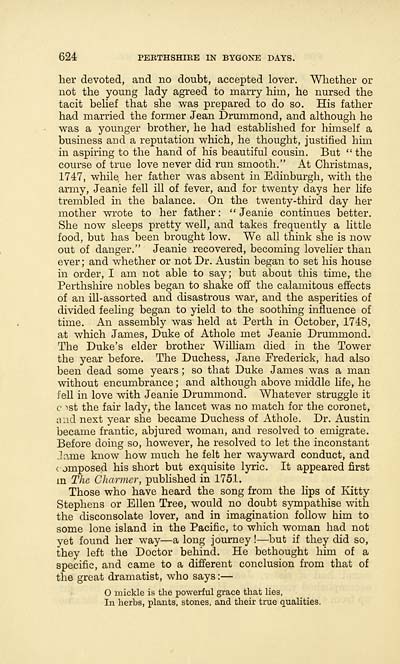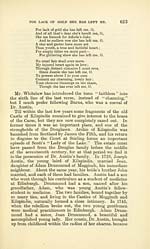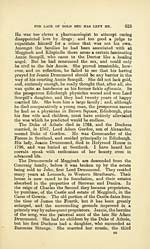Perthshire in bygone days
(652) Page 624
Download files
Complete book:
Individual page:
Thumbnail gallery: Grid view | List view

624 PEBTHSHIEE IN BYGONE DAYS.
her devoted, and no doubt, accepted lover. Whether or
not the young lady agreed to marry him, he nursed the
tacit belief that she was prepared to do so. His father
had married the former Jean Drummond, and although he
was a younger brother, he had established for himself a
business and a reputation which, he thought, justified him
in aspiring to the hand of his beautiful cousin. But "the
course of true love never did run smooth." At Christmas,
1747, while her father was absent in Edinburgh, with the
army, Jeanie fell ill of fever, and for twenty days her life
trembled in the balance. On the twenty-third day her
mother wrote to her father : " Jeanie continues better.
She now sleeps pretty well, and takes frequently a little
food, but has been brought low. We all think she is now
out of danger." Jeanie recovered, becoming lovelier than
ever; and whether or not Dr. Austin began to set his house
in order, I am not able to say; but about this time, the
Perthshire nobles began to shake off the calamitous effects
of an ill-assorted and disastrous war, and the asperities of
divided feeling began to yield to the soothing influence of
time. An assembly was held at Perth in October, 1748,
at which James, Duke of Athole met Jeanie Drummond.
The Duke's elder brother William died in the Tower
the year before. The Duchess, Jane Frederick, had also
been dead some years ; so that Duke James was a man
without encumbrance ; and although above middle life, he
fell in love with Jeanie Drummond. Whatever struggle it
c ^st the fair lady, the lancet was no match for the coronet,
and next year she became Duchess of Athole. Dr. Austin
became frantic, abjured woman, and resolved to emigrate.
Before doing so, however, he resolved to let the inconstant
lame know how much he felt her wayward conduct, and
( jmposed his short but exquisite lyric. It appeared first
in The Charmer, published in 1751.
Those who have heard the song from the lips of Kitty
Stephens or Ellen Tree, would no doubt sympathise with
the disconsolate lover, and in imagination follow him to
some lone island in the Pacific, to which woman had not
yet found her way — a long journey ! — but if they did so,
they left the Doctor behind. He bethought him of a
specific, and came to a different conclusion from that of
the great dramatist, who says : —
O mickle is the powerful grace that lies,
In herbs, plants, stones, and their true qualities.
her devoted, and no doubt, accepted lover. Whether or
not the young lady agreed to marry him, he nursed the
tacit belief that she was prepared to do so. His father
had married the former Jean Drummond, and although he
was a younger brother, he had established for himself a
business and a reputation which, he thought, justified him
in aspiring to the hand of his beautiful cousin. But "the
course of true love never did run smooth." At Christmas,
1747, while her father was absent in Edinburgh, with the
army, Jeanie fell ill of fever, and for twenty days her life
trembled in the balance. On the twenty-third day her
mother wrote to her father : " Jeanie continues better.
She now sleeps pretty well, and takes frequently a little
food, but has been brought low. We all think she is now
out of danger." Jeanie recovered, becoming lovelier than
ever; and whether or not Dr. Austin began to set his house
in order, I am not able to say; but about this time, the
Perthshire nobles began to shake off the calamitous effects
of an ill-assorted and disastrous war, and the asperities of
divided feeling began to yield to the soothing influence of
time. An assembly was held at Perth in October, 1748,
at which James, Duke of Athole met Jeanie Drummond.
The Duke's elder brother William died in the Tower
the year before. The Duchess, Jane Frederick, had also
been dead some years ; so that Duke James was a man
without encumbrance ; and although above middle life, he
fell in love with Jeanie Drummond. Whatever struggle it
c ^st the fair lady, the lancet was no match for the coronet,
and next year she became Duchess of Athole. Dr. Austin
became frantic, abjured woman, and resolved to emigrate.
Before doing so, however, he resolved to let the inconstant
lame know how much he felt her wayward conduct, and
( jmposed his short but exquisite lyric. It appeared first
in The Charmer, published in 1751.
Those who have heard the song from the lips of Kitty
Stephens or Ellen Tree, would no doubt sympathise with
the disconsolate lover, and in imagination follow him to
some lone island in the Pacific, to which woman had not
yet found her way — a long journey ! — but if they did so,
they left the Doctor behind. He bethought him of a
specific, and came to a different conclusion from that of
the great dramatist, who says : —
O mickle is the powerful grace that lies,
In herbs, plants, stones, and their true qualities.
Set display mode to:
![]() Universal Viewer |
Universal Viewer | ![]() Mirador |
Large image | Transcription
Mirador |
Large image | Transcription
Images and transcriptions on this page, including medium image downloads, may be used under the Creative Commons Attribution 4.0 International Licence unless otherwise stated. ![]()
| Histories of Scottish families > Perthshire in bygone days > (652) Page 624 |
|---|
| Permanent URL | https://digital.nls.uk/94914222 |
|---|
| Description | A selection of almost 400 printed items relating to the history of Scottish families, mostly dating from the 19th and early 20th centuries. Includes memoirs, genealogies and clan histories, with a few produced by emigrant families. The earliest family history goes back to AD 916. |
|---|

